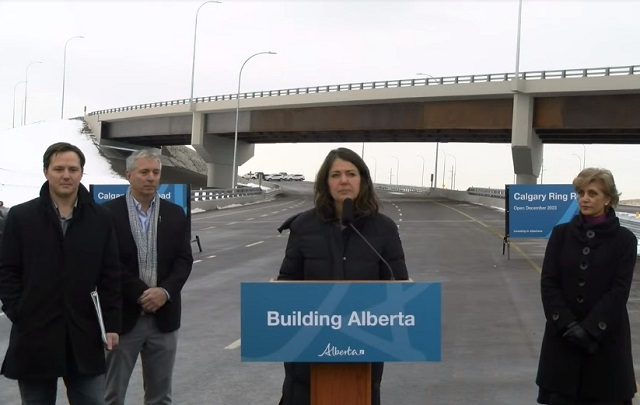Alberta
Calgary Ring Road opens 10 months early

Christmas comes early for Calgary drivers
The Calgary Ring Road is now ready to be opened to public traffic, several months ahead of schedule.
Calgary’s ring road is one of the largest infrastructure undertakings in Calgary’s history and includes 197 new bridges and 48 interchanges. The 101-kilometre free-flowing Calgary Ring Road will open to traffic Dec. 19, completing a project decades in the making.
“Calgary’s ring road is a project that has been decades in the making and its completion is a real cause for celebration. This has been an important project and our government got it done. With this final section completed, travelling just got a little easier for families and for workers. This will not only benefit Calgarians and residents in the metro region, it will provide a boost to our economy, as goods can be transported more easily across our province.”
Although construction of the entire ring road project began in 1999 under former premier Ralph Klein, discussions on a ring road around the City of Calgary began as early as the 1950s. In the late 1970s, under former premier Peter Lougheed, high-level planning and land acquisition started and a transportation utility corridor was established to make the Calgary Ring Road a reality.
“The final section of the Calgary Ring Road is now complete, and I’d like to acknowledge the work done by former premiers and transportation ministers and their vision to build Alberta. I’m proud to announce that the final section was completed on budget and months ahead of schedule.”
“I’m thrilled to see the Calgary Ring Road project completed. It was something I have helped shepherd through the process since 2014. Finally, all the hard work put in by everyone has become a reality. The Calgary Ring Road will provide travellers with over 100 kilometres of free-flow travel, create new travel options for the City of Calgary and surrounding area and provide improved market access across the region.”
Opening the ring road means new travel options for Calgarians, which will draw traffic away from heavily travelled and congested roads such as the Deerfoot Trail, 16th Avenue, Glenmore Trail and Sarcee Trail. For commercial carriers, the ring road provides an efficient bypass route, saving time and money for the delivery and shipment of goods and services.
“The ring road investment generated thousands of local jobs and will now play an integral role in keeping Calgarians and the economy moving. This important transportation link will ease congestion on city routes and greatly improve connectivity and access for businesses transporting goods.”
The ring road is a critical component to growing economic corridors in Alberta and Western Canada, as it connects the Trans-Canada Highway to the east and west, and the Queen Elizabeth II Highway and Highway 2 to the north and south. It is also part of the CANAMEX corridor, which connects Alberta to the highway network in the United States and Mexico.
The completion of the ring road is a major boost for Calgary, opening new business opportunities and supporting key components of the Calgary economy. It sends a signal to businesses and investors that Calgary has a strong highway infrastructure, providing economic corridor connections through the entire region.
“With one of the smoothest commutes in Canada and the capacity to reach 16 million customers by road within a single day, Calgary offers unmatched quality of life and economic opportunities. The triumphant completion of the Calgary Ring Road further improves our capacity to attract even more companies, capital and talent to our city.”
“This is an exciting step forward for the Calgary Metropolitan Region. This key artery will not only improve the quality of life for the residents of the region, it is also a key economic enabler and we are thrilled to see its completion.”
Quick facts
- Stretched into a single lane, the highway is 1,304 kilometres long, the distance from Calgary to Winnipeg.
- Other sections opened in 2009, 2013, 2020 and 2023.
- The West Calgary Ring Road is the final piece of the ring road project.
Alberta
Former senior financial advisor charged with embezzling millions from Red Deer area residents

News release from Alberta RCMP
Former senior financial advisor charged for misappropriating nearly $5 million from clients
On April 4, 2024, the RCMP’s Provincial Financial Crime Team charged a Calgary resident for fraud-related offences after embezzling millions of dollars from his clients while serving as a senior financial advisor.
Following a thorough investigation, the accused is alleged to have fraudulently withdrawn funds from client accounts and deposited them into bank accounts he personally controlled. A total of sixteen victims were identified in the Red Deer area and suffered a combined loss of nearly $5 million.
Marc St. Pierre, 52, a resident of Calgary, was arrested and charged with:
- Fraud over $5,000 contrary to section 380(1)(a) of the Criminal Code; and,
- Theft over $5,000 contrary to section 344(a) of the Criminal Code.
St. Pierre is scheduled to appear in Red Deer Provincial Court on May 14, 2024.
“The ability for financial advisors to leverage their position to conduct frauds and investment scams represents a significant risk to the integrity of Alberta’s financial institutions. The investigation serves as an important reminder for all banking clients to regularly check their accounts for any suspicious activity and to report it to their bank’s fraud prevention team.”
- Sgt. John Lamming, Provincial Financial Crime Team
The Provincial Financial Crime Team is a specialized unit that conducts investigations relating to multi-jurisdictional serious fraud, investments scams and corruption.
Alberta
Political parties will be part of municipal elections in Edmonton and Calgary pilot projects

Strengthening Alberta’s local elections
Alberta’s government is introducing legislation to ensure Albertans can rely on transparent, free and fair elections, and municipally-elected officials have clearer accountability measures.
In a democratic society, Albertans expect their local elections to be free and fair, and their elected officials to be held to account by clear rules that govern their local councils. The Municipal Affairs Statutes Amendment Act proposes amendments to the Local Authorities Election Act (LAEA) and the Municipal Government Act (MGA) to add greater transparency to local election processes and ensure local councils and elected officials continue to remain accountable to the citizens who elected them.
“Our government is committed to strengthening Albertans’ trust in their local governments and the democratic process that elects local leaders. The changes we are making increase transparency for Alberta voters and provide surety their votes will be counted accurately. We know how important local democracy is to Albertans, and we will work with local authorities to protect and enhance the integrity of local elections.”
Local Authorities Election Act
Albertans expect free and fair elections and that’s why it’s important we strengthen the rules that govern local elections. To strengthen public trust in local elections, Alberta’s government will eliminate the use of electronic tabulators and other automated voting machines. All Albertans should be able to trust the methods and results of local elections; requiring all ballots to be counted by hand, clarifying rules and streamlining processes for scrutineers will provide voters greater assurance in the integrity of the results.
All eligible Albertans should be able to vote in local elections without impediment. Alberta’s government will limit the barriers for eligible voters to cast a ballot by expanding the use of special ballots. Currently, special ballots can only be requested for very specific reasons, including physical disability, absence from the municipality, or for municipal election workers. By expanding the use of special ballots, the government is encouraging more voter participation.
Amendments in the Municipal Affairs Statutes Amendment Act would increase transparency in local elections by enabling political parties at the local level. Political parties would be enabled in a pilot project for Edmonton and Calgary. The act will not require candidates to join a political party in order to run for a local or municipal office, but will create the opportunity to do so.
In addition, proposed changes to the Local Authorities Election Act would allow municipalities the option to require criminal record checks for local candidates, thus increasing transparency and trust in candidates who may go on to become elected officials.
Municipal Government Act
The role of an elected official is one with tremendous responsibility and expectations. Changes proposed to the Municipal Government Act (MGA) will strengthen the accountability of locally elected officials and councils. These include requiring mandatory orientation training for councillors, allowing elected officials to recuse themselves for real or perceived conflicts of interest without third-party review and requiring a councillor’s seat to become vacant upon disqualification.
If passed, the Municipal Affairs Statutes Amendment Act will also unlock new tools to build affordable and attainable housing across Alberta. Proposed amendments under the MGA would also create more options for municipalities to accelerate housing developments in their communities. Options include:
- Exempting non-profit, subsidized affordable housing from both municipal and education property taxes;
- Requiring municipalities to offer digital participation for public hearings about planning and development, and restricting municipalities from holding extra public hearings that are not already required by legislation; and
- Enabling municipalities to offer multi-year residential property tax exemptions.
Municipal Affairs will engage municipalities and other partners over the coming months to hear perspectives and gather feedback to help develop regulations.
Quick facts
- The LAEA establishes the framework for the conduct of elections in Alberta municipalities, school divisions, irrigation districts and Metis Settlements.
- The MGA establishes the rules governing the conduct of local elected officials once on council, as well as the overall administration and operation of municipal authorities in Alberta, including any policy those authorities may wish to implement.
Related information
-

 Business2 days ago
Business2 days agoUN plastics plans are unscientific and unrealistic
-

 Business1 day ago
Business1 day agoTaxpayers criticize Trudeau and Ford for Honda deal
-

 Business2 days ago
Business2 days agoDon’t be fooled by high-speed rail
-

 Alberta2 days ago
Alberta2 days agoActivity-Based Hospital Funding in Alberta: Insights from Quebec and Australia
-

 Addictions2 days ago
Addictions2 days agoBritish Columbia should allow addicts to possess even more drugs, federal report suggests
-

 Fraser Institute2 days ago
Fraser Institute2 days agoCanadians should decide what to do with their money—not politicians and bureaucrats
-

 Alberta1 day ago
Alberta1 day agoAlberta rejects unconstitutional cap on plastic production
-

 Censorship Industrial Complex1 day ago
Censorship Industrial Complex1 day agoAustralian politicians attack Elon Musk for refusing to remove video of Orthodox bishop’s stabbing








